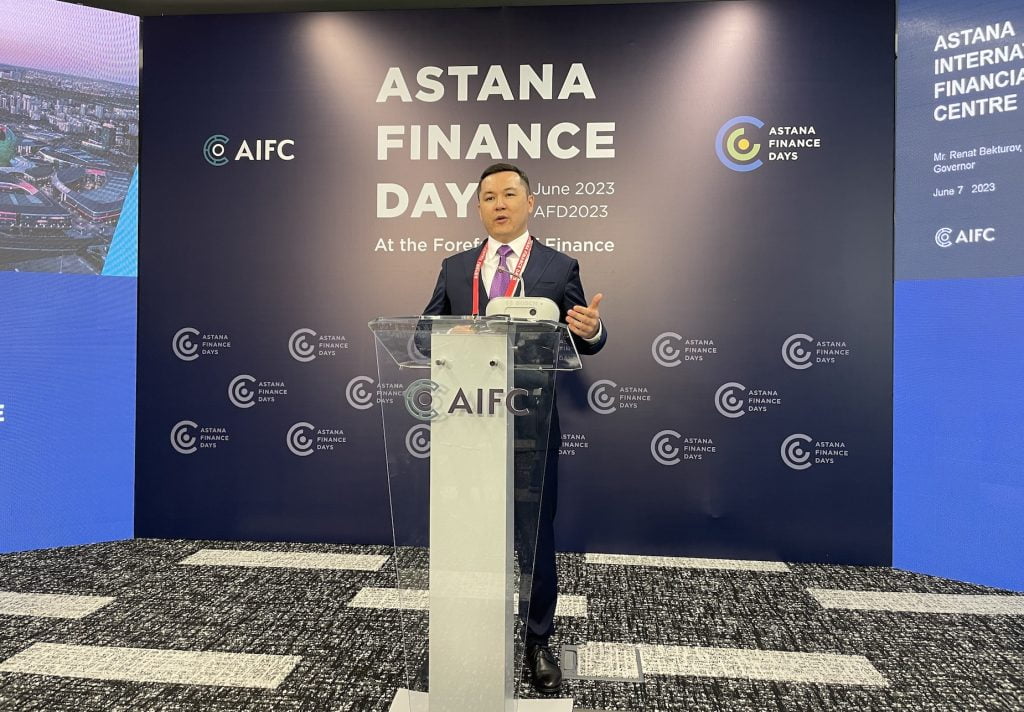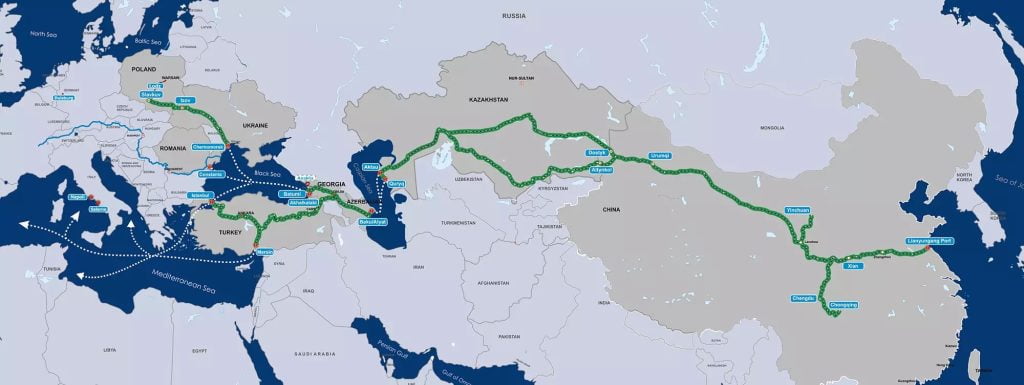As many countries are planning sustainability and decarbonization strategies to meet climate targets, Kazakhstan, one of the world’s largest energy producers, wants to be part of the global solution and strives to attract foreign investors to help implement a new green portfolio.
One of the priorities is responsible investment, Astana International Finance Center Governor (AIGC) Renat Bekturov told NE Global on the sidelines of the Astana Finance Days on June 7.
“That is one of the key areas for our government to attract investment and to make sure that this energy transition happened,” he said, adding that Kazakhstan has signed the Paris Agreement and President Kassym-Jomart Tokayev has committed the country’s economy to become carbon neutral by 2060. “That requires hundreds of billion US dollars of investment. And the first milestone is to achieve 15% of renewable sources by 2030 and that only requires $10 billion US dollars of investment,” he said. “We now are exploring the opportunities of building wind-generated power plants with UAE-based Masdar, with the Kingdom of Saudi Arabia-based ACWA Power. We have already a portfolio of these kind of projects in the region. Total has signed an agreement also with Samruk-Kazyna wealth fund to build a wind farm. China Power is interested, and I think there will be investors into solar power as well because of the vast resources of wind and solar in Kazakhstan,” Bekturov added.

“We, as a financial center, will focus on creating an emissions trading system that will be also an enabler for the energy transition so that investors will invest into a new green projects and then they can get their carbon credit for that which can be traded that creates a cash flow. That’s why I think these emission trading systems are important enablers of energy transition,” he said.
Bekturov noted that the Astana International Finance Center is cooperating with Kazakhstan’s Ecology and Natural Resources Minister, who is the regulator in that segment, to make sure that this step towards the emission trading system will be gradual. “We recognize that we have a cheap energy source, so we have to be very careful in planning how do we transition without killing the industries,” he said.
Bekturov reminded that the European Union plans to introduce CBAM (EU’s Carbon Border Adjustment Mechanism), a cross-border carbon tax by 2025. The CBAM itself will enter into application in its transitional phase on 1 October 2023, with the first reporting period for EU importers of CBAM goods ending 31 January 2024. It will initially apply to imports of certain goods and selected precursors whose production is carbon intensive and at most significant risk of carbon leakage: cement, iron and steel, aluminium, fertilisers, electricity and hydrogen. “I’m strong believer that if we don’t invest today, we will have to bear the cost tomorrow so this is a very important area and is recognized at the government level,” he said.
Kazakhstan’s green transition push
To move towards these goals, on June 8–9, Kazakhstan hosted the inaugural Astana International Forum, which this year focused on climate change, energy and water security, green transition, transport and connectivity.
“The fundamental point is: just as a combination of geopolitical pressures are pushing us apart, we face a clear, strong imperative to come together, to engage, to collaborate, and to align with one another,” Tokayev said in his opening speech at the forum’s plenary session on June 8. “At such a time, the Astana International Forum is one of many possible steps to reverse this trend. Only by meeting together, taking counsel together, being mutually honest about our problems, our concerns and our hopes, can the international community address these issues. Only this way can we shape our shared future, and return to the gradual building of a more stable, equitable, and prosperous world for all,” the Kazakh head of state added.
“Of all the challenges we face, perhaps the most existential is climate change. Central Asia is one of its front lines. Even if we successfully limit global temperature rise to 1.5 Celsius by 2050 – which looks increasingly unlikely – we will experience between 2 and 2.5 Celsius of temperature rise here in Central Asia,” Tokayev said.
Kazakhstan’s Ecology and Natural Resources Minister Zulfiya Suleimenova told NE Global on the sidelines of the Astana International Forum on June 8 that there are many green projects which are aimed at sustainability but also Kazakhstan plans to become part of the global solution. “So, I think Astana International Forum is the platform which is aimed to bring different stakeholders from different parts of the world and create the platform for the discussions, for the dialogue but really create the partnerships and initiatives, strengthening the bonds between different participants, between different actors,” she added.
Suleimenova acknowledged that green energy and renewables are not necessarily a big portion of Kazakhstan’s current energy mix. “But we see quite a good upward trend in renewables. There are a few big mega projects which are planned so once they are implemented it’s going to change the picture for the renewables but, at the same time, the energy transition, the transition towards renewables has to be gradual. One of the things which is very important to bear in mind is, of course, energy security but also the transition has to be just. We cannot forget the most vulnerable members of our communities. So, while we are moving towards a greener future, we must also be tackling all the societal aspects related to this transition,” Suleimenova said.
During the Astana International Forum on June 8-9, Tokayev met with Eni CEO Claudio Descalzi to discuss the Italian company’s activities and decarbonization initiatives in the country. Following the meeting, Eni and KazMunayGas (KMG), the national operator of the oil and gas industry of Kazakhstan, announced plans to launch a joint 250-megawatt Hybrid Renewables-Gas Power Plant project in Zhanaozen in the Mangystau Region.

“As a Ministry of Ecology we agree with all the other ministries that we are moving towards a decarbonized society,” Suleimenova said. “For that we have adopted a new strategy for carbon neutrality by 2060 and the important pillar will be the energy transition because over 80% of our emissions come from the energy sector so we cannot speak about decarbonization without speaking about decarbonizing the energy sector so our job is to basically create the proper, the favorable environment in which there is an uptake of renewables,” she said, adding that by 2030, Kazakhstan will create all the important preconditions that will further push the country towards a decarbonized society.
The Ecology and Natural Resources Minister stressed that one of the important pillars of the sustainable development agenda is leaving no one behind. “What we are very much aware about is that our transition should not leave anyone behind. What should be the policies that would facilitate the transition of these people towards alternative sources, less polluting sources. Connecting even to centralized heating because that would reduce a lot the burning of coal,” she said.
Mining and rare earth metals
Asked by NE Global about developing Kazakhstan’s rare earth minerals, Kazakhstan’s National Economy Minister Alibek Kuantyrov told a press conference that making the transition to carbon neutrality by 2060 presents a great economic and societal challenge for Kazakhstan.

“Since Kazakhstan’s energy balance depends on coal by 69%, we want to decrease that share so it will be done naturally,” he said. Kuantyrov noted that the country plans to use nuclear power and natural gas in its energy transition before going 100% renewable by 2060. Moreover, the country does not want to just trade oil and gas and minerals but also rare earths, he said, adding, “We want not just to trade or to export rare earths materials but to open production to add as much value as we can”.
The Middle Corridor
Kazakhstan’s Deputy Foreign Minister Roman Vassilenko stressed that his country’s strategic geographic position in the heart of Eurasia and credibility as a bridge builder on the international stage means Kazakhstan is well-suited to bring together representatives of different countries and regions. “In this regard, Kazakhstan is rapidly becoming a prominent transcontinental transport hub, connecting markets in the West with those in the East, as well as those in the North and the South. This ambition is embodied in the ‘Middle Corridor’ that links China and the EU via rail, sea, and road. This visionary Trans-Caspian International Transport Route is a critical, relatively new, trade artery traversing Central Asia, the Caucasus, and Türkiye, spanning the Caspian and Black Seas,” he said, during a briefing at the Foreign Ministry.

“I say ‘relatively new’ because this route is the restoration of the ancient Great Silk Road in the modern environment, pure and simple. Where in the past camel caravans carried silk and fragrances from the East to Europe, now trains and trucks transport IPhones and computers, and other types of cargo,” Vassilenko said. “Given the importance of alternative trade routes, participants at the AIF will discuss how to strengthen the Eurasian connectivity and make use of the growing role of the Middle Corridor,” Kazakhstan’s deputy Foreign Minister added.
The Middle Corridor has gained geopolitical importance as an alternative transport route to the West, following the Russian-Ukrainian War.
Fostering green investments
The landscape in Kazakhstan changed a lot in the last three years, Suleimenova told NE Global. “To be honest, we did not speak about climate or environment that much, that often. These times we speak about climate and environment every time, all the time and when we meet big investors in Kazakhstan, I have been meeting some of them, too, we always speak about the importance of decarbonization, about the solutions which we can bring, how to bridge the investments with some green solutions. Because when we are improving the environment, we are improving the quality of life, so this link is inevitable,” Kazakhstan’s soft-spoken Ecology and Natural Resources Minister said, adding, “I’m very happy and I’m very proud to see that there is much more of these very good discussions and there is a very good understanding from our investors, from our government agencies, from our civil society that the future is green, that we are moving in that direction. It is not easy, but we want to see ourselves move in that direction and see ourselves in the green future. So, we as a country, of course, we will be taking all the steps to achieve that”.








